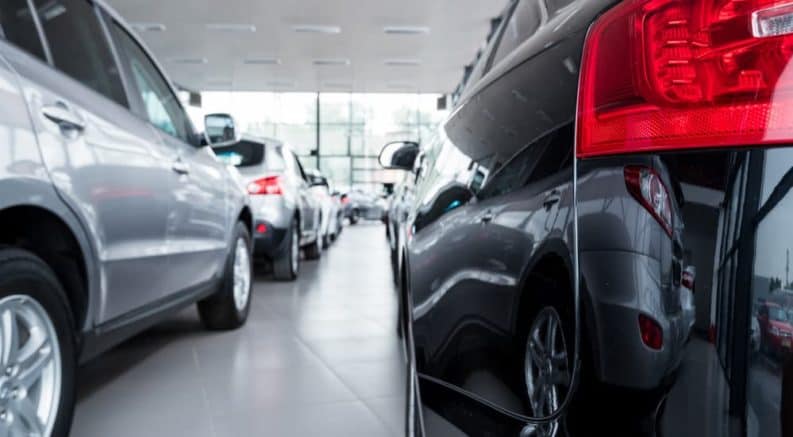You can read article upon article as you prepare for your purchase of a used SUV, but seemingly nothing will prep you for the actual buying experience. While we’re constantly striving to help all of our readers with negotiations, self-inspections, and any other important steps of the buying process, you still can’t truly gauge your impending ordeal until you’re in the actual dealership.
Fortunately for you, this writer has recent experience with buying a used SUV, and I’m excited to pass along some lesser-thought-of tips to you! Below, I’ve explored several things that you should be keeping in mind as you’re shopping for a used SUV (in fact, these tips would be relevant for any type of used car, but I digress).
Take a peek at the tips below, and let us know if there’s anything you’d add to the list!
Tip #1: Know What You’re Signing
Even though I write about the automotive industry for a living, no amount of written material can truly prepare you for the used car-buying experience. It’s like practice vs games; sure, the practice does a nice job of simulating game conditions and preparing you for the real-life event, but you won’t truly know how you’ll act until you’re in those legitimate game conditions. This is how it is when it comes to car buying. In my mind, I was totally prepared for all of the tactics that the sales team would throw my way. But, I completely threw many of my prepared strategies completely out the window.
While I had simply requested a test drive on a handful of cars (and this was going to be the extent of my day’s dealings with that particular dealership), the salesman instead took me inside to discuss my budget and goals. This seemed like a relatively harmless exercise; the salesperson assured me that they were simply looking out for my financial well-being. By having a better understanding of my credit, down payment, and monthly payment, they could better zero in on a vehicle. This made plenty of sense, and even though I was eyeing a handful of pre-owned vehicles, I figured the salesperson knew best. Even if I wasn’t intent on buying, I appreciated the effort.
However, after jotting down all of the information, the salesperson had me sign some papers. I assumed this was some document to assure that my budget was authentic, although, in hindsight, I’m not sure how they could have gone after me if I was disingenuous. Either way, I quickly looked over the document, didn’t see any glaring issues, and signed away.
I instantly recognized my mistake. I provided the dealership with an opportunity to do a hard credit check. While these inquiries are essential towards the end of your negotiations, they merely gave the dealership clarity at this particular moment. While my credit wasn’t necessarily bad, it also wasn’t glowing, and this hard inquiry had the predictable negative impact that I expected. In other words, this hard inquiry exasperated any “credit issues” I may have been dealing with.
Part of the buyer-seller relationship is trust, and the salesperson could have easily proceeded with the sales pitch despite not knowing my definitive credit score. I understand his desire not to waste his valuable time, but what incentive would I have to lie about my credit?
So, what lesson did I learn? Make sure you’re completely aware of the documents that you’re signing, especially if they’re going to have a negative influence on your credit and/or budget. While a salesperson may try to assure you that these signatures are necessary to proceed with the buying process, they’re not going to kick you out the door if you don’t consent. It is so important to visit a dealership you have positively worked with in the past or that you know has a great reputation. That way, you can avoid instances like this one altogether.
Tip #2: Remember That You’re Choosing the SUV… They Aren’t
Depending on the combination of your credit, budgeted monthly payments, and down payment, you’ll likely have a selection of vehicles that you can choose from.
While dealerships are focused on providing customers with a vehicle that fits their specific wants and budget, they’re also sometimes focused on moving inventory. But, as the buyer, you’re ultimately the one with all of the power. Sure, you may have to ignore some of your initial targets based on your budget, but that doesn’t mean you won’t have at least several vehicles to choose from. While the dealership may “strongly suggest” that you opt for a particular offering, there shouldn’t be any pressure to buy. Rather, you have all the rights to explore their inventory for similarly-priced vehicles.
What’s the benefit of holding strong? Well, for starters, you’re the one putting down the big money on this impending purchase, so you should be opting for an eligible vehicle that you want. While you may ultimately land on the vehicle that the dealership matched you with, it’s still in your best interest to shop around.
Tip #3: Request Complete Transparency From the Dealership and Sales Team
Trust is big during any purchase, and this is especially relevant when you’re making a pricey transaction. Therefore, you should require complete transparency from your dealership. If the sales team is unwilling to disclose any piece of request information (assuming that information is readily available), then this should be a major cause for concern.
For instance, for whatever reason, a dealership may not be willing to disclose the asking price for a used SUV right away. Instead, they may try to pair you with a particular vehicle and get you to love their choice. When the time comes to learn the price, you’ll end up disappointed that your first pick is out of your means.
This transparency also applies to the condition of the vehicle. The dealership is required to provide the customer with information about damage or accidents, and many sellers even include a Carfax history report. However, if this information isn’t available, you should be wary of proceeding with a sale. If the dealership isn’t willing to disclose the vehicle’s history, how can you know that you’re not opting for a pseudo lemon? If the dealership isn’t being completely transparent throughout the buying process, it’s in your best interest to visit another business.
My best advice for anyone shopping for a used SUV is to trust your gut in trusting the dealership. While there are plenty of questionable dealers out there, there are also plenty of great businesses with excellent reputations. If you run into any of these negative experiences that I had, or simply don’t care for the inventory, just know you have other options. Ask around with your friends and family, check out online reviews, and speak with the sales team before visiting the dealership to get a feel for their buying experience. Ultimately, I made the right choice in choosing a different dealership than the initial one I visited and ended up with a great used SUV.





